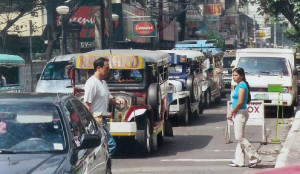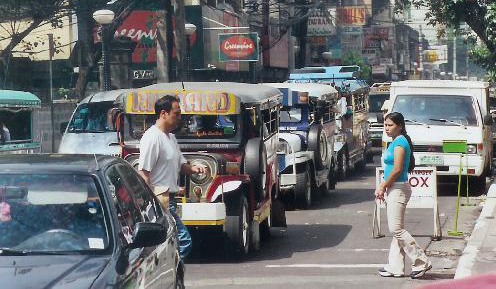 PHILIPPINE transport stakeholders have formed a team that will take action against the Manila City government’s implementation of a daytime truck ban on Feb. 24.
PHILIPPINE transport stakeholders have formed a team that will take action against the Manila City government’s implementation of a daytime truck ban on Feb. 24.
The team, comprising members of organizations that attended a meeting on Feb. 10 called by the Port Users Confederation (PUC), will write letters to the departments of Trade and Industry, Finance and Transportation and Communications as well as Manila Mayor Joseph Estrada to explain the adverse effects of the truck ban. They will also meet with Manila City Hall officials and other government agencies.
In attendance at Monday’s meeting were representatives of port operators International Container Terminal Services, Inc., Asian Terminals Inc., and Manila North Harbour Port Inc.; Confederation of Truckers Association of the Philippines, and the Philippine Ports Authority.
It may be recalled that on Feb. 5, Mayor Estrada signed Ordinance No. 8336 amending certain provisions of City Ordinance No. 8092 (otherwise known as the “Traffic Management Code of the City of Manila and Appendix V thereof and for Other Purposes”). The ordinance bans all trucks with eight wheels and more with gross weight of 4,500 kilograms from plying Manila streets from 5am to 9pm; they will only be allowed from 9pm to 5am on designated truck routes.
PUC president Rodolfo de Ocampo said the convenors expect a result —negative or positive — of their action by Thursday at the latest.
At the meeting, it was suggested that a designated truck lane be kept open 24 hours a day.
As early as Feb. 6, stakeholders, specifically truckers, sent letters to different government agencies explaining the effects of the ordinance on the economy.
De Ocampo described the ordinance as “very harmful” to businesses. PUC immediate past president and now director Dominador de Guzman said the ban is “detrimental” even though its intent is “noble”.
He said the ban will have adverse effects, considering all main ports are located in Manila along with empty container depots, off-dock container yards, and government agencies such as the Department of Finance and the Bureau of Customs.
De Ocampo noted that in a sense all stakeholders are business partners, a statement seconded by Manila International Container Terminal (MICT) general manager Christian Gonzalez.
“Without each one of us performing efficiently, you’re not going to see a 7% growth… In fact, what we’ll see is recession,” Gonzalez said.
“What do you think is going to happen to the 7% economic growth? It’s not going to be cut in half but (will) get to negative territory,” he said.
Gonzalez, citing EDSA, even asked: “Why is the worst traffic in Metro Manila on a stretch of road that has a 24-hour truck ban?”
The solution to the problem, he said, is “more capacity” and more investment.
“We should lobby for a no truck ban, period,” he added.
Malou Ronquillo, PUC director and president of the Association of SEIPI (Semiconductor and Electronics Industries in the Philippines) Logistics Managers, told PortCalls the ordinance will greatly affect the semi-conductor and electronics sector, the country’s dominant export grouping.
With the truck ban, she said, deliveries would be limited, noting that most electronics companies have 24/7 production with “most of the time (materials coming in just-in-time).”
Delayed deliveries would also impact on other industries that rely heavily on deliveries of raw material, she added.
Ronquillo said one alternative would be the use of airports, but that would be expensive plus some goods, such as those classified as dangerous commodities, are not allowed on airplanes. Some products, such as batteries, can only be shipped via sea, she noted.
As for using vans instead of containers, there will be added costs since products are going to be stripped from containers and transferred to two or more vans.
In the end, Ronquillo said the additional cost will only be passed on to consumers.
A separate meeting called by the Aduana Business Club attended by representatives from the Department of Labor and Employment, Philippine Economic Zone Authority, and Integrated North Harbor Truckers Association also on Feb. 10 discussed resorting to legal remedies, with a warning that if nothing happened, a trucking holiday could be held on Feb. 24.
The Association of International Shipping Lines (AISL), meanwhile, wrote a letter to Estrada saying it is particularly concerned about Section 2 of the ordinance, which prescribes the details of the ban.
“The Philippines has just transformed from an agriculture-based to a newly industrialized country status which depends heavily on services and manufacturing,” AISL said, and a tight 8-hour window will “inevitably take its toll on the steady supply of raw materials to manufacturers.”
Shipping costs will also shoot up as container turnaround suffers because of limited movement of trucks, and will “pose a big burden on the business community as increased prices will be passed on to the ultimate consumer/user without mentioning its impact on the competitiveness of Philippine exports,” AISL said.
The short window for truck movement will also congest container yards, the association said.
“The problem will be compounded when the MICT and South Harbor decide to limit the delivery of empty containers for repositioning out of the country,” said AISL, a grouping of 42 international shipping lines.–– Roumina M. Pablo





